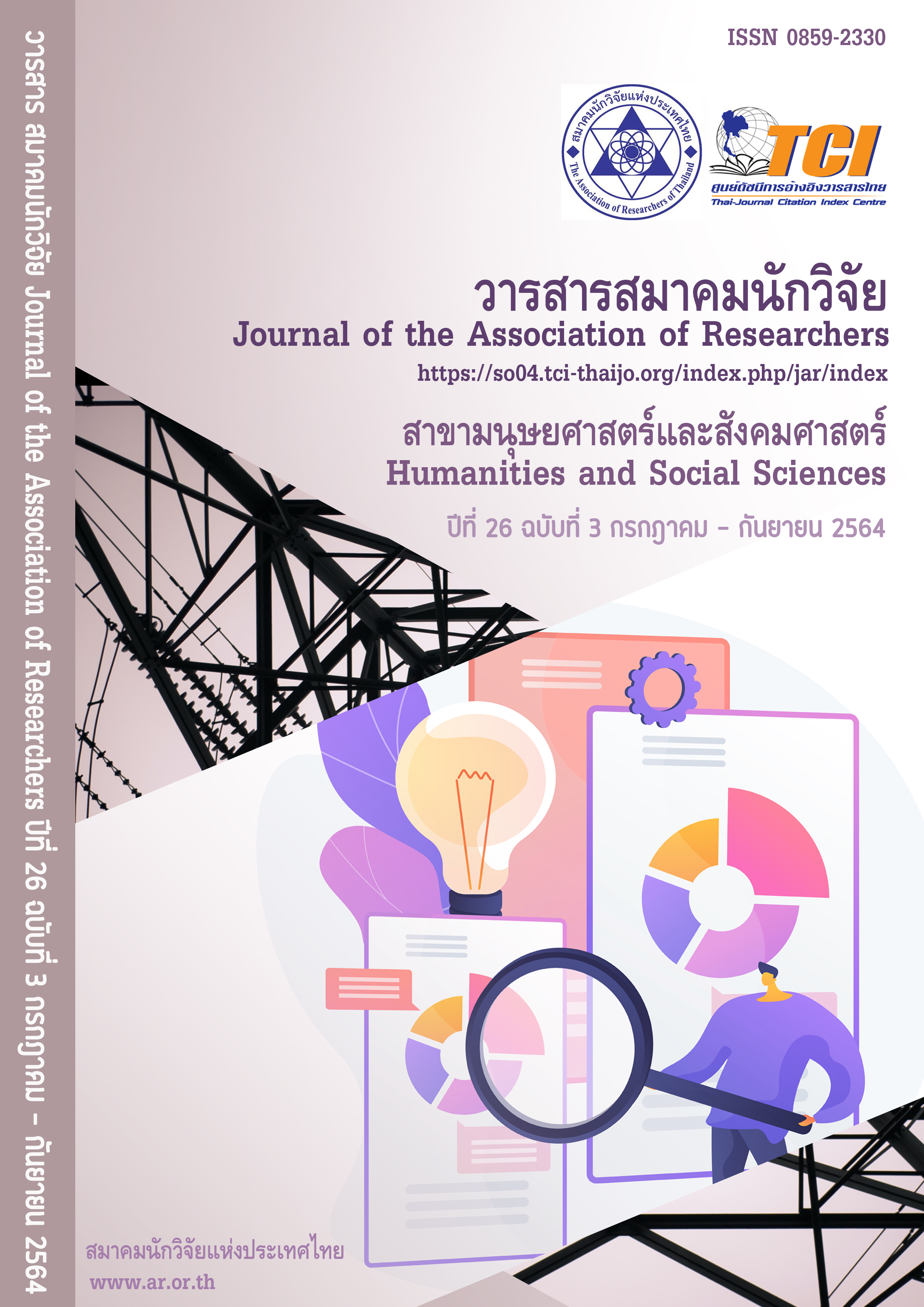Promoting e-tourism in Thailand
Main Article Content
Abstract
The objective of this study was to investigate 1) the demographic characteristics of Thai tourists in promoting e-tourism in Thailand related to the marketing mix and 2) the demographic characteristics of Thai tourists in promoting e-tourism in Thailand related to online marketing strategy. This study was quantitative research. A questionnaire was used as a research instrument to collect data from 400 Thai tourists. This study determined a consistency coefficient. The questionnaire’s consistency index was 0.50. Data were analyzed using descriptive statistics, including percentage, mean, and standard deviation. The analytic results of e-tourism promotion in Thailand affecting the opinion on the marketing mix factors showed that in terms of the marketing mix, a factor with the highest level of satisfaction was a process. In addition, overall satisfaction with the product, price, place, promotion, people, and physical evidence was at a high level, respectively. The results of the research hypothesis test showed that the demographic characteristics of age, career, the average income per month, and status have correlated with marketing mix factors (7P) in promoting e-tourism in Thailand, and the demographic characteristics of sex, education, career, and status have correlated with marketing online (5 As) ใ in promoting e-tourism in Thailand
Article Details
บทความที่ปรากฏในวารสารนี้ เป็นความรับผิดชอบของผู้เขียน ซึ่งสมาคมนักวิจัยไม่จำเป็นต้องเห็นด้วยเสมอไป การนำเสนอผลงานวิจัยและบทความในวารสารนี้ไปเผยแพร่สามารถกระทำได้ โดยระบุแหล่งอ้างอิงจาก "วารสารสมาคมนักวิจัย"
References
วิเชียร วงศ์ณิชชากุล. (2550). การบริหารการส่งเสริมการตลาด. กรุงเทพมหานคร : มหาวิทยาลัยกรุงเทพ.
ดวงใจ ธรรมนิภานนท์. (2557). กลยุทธ์การตลาดผลิตภัณฑ์ความงามผ่านช่องทางการค้าแบบดิจิทัล. สารนิพนธ์ปริญญามหาบัณฑิต, มหาวิทยาลัยเนชั่น.
สุรเดช สุเมธาภิวัฒน์. (2559). กลยุทธ์ส่งเสริมการขายมุ่งสู่ผู้บริโภคในยุค Digital Marketing. วารสารวิทยาลัยสันตพล, 5(1), 172 – 177.
สุประภา สมนักพงษ์. (2560). แนวโน้มและตลาดการท่องเที่ยว4.0 ประเทศไทย. วารสาร Veridian E Journal สาขามนุษยศาสตร์ สังคมศาสตร์ และศิลปะศาสตร์ มหาวิทยาลัยศิลปากร, 10(3), 2055-2068.
เสรี วงษ์มณฑา. (2542). กลยุทธ์การตลาด การวางแผนการตลาด. กรุงเทพมหานคร: ธีระฟิล์มและไซเท็กซ์.
ศิริวรรณ เสรีรัตน์ ปริญ ลักษิตานนท์ และศุภร เสรีรัตน์. (2552). การบริหารตลาดยุคใหม่. กรุงเทพมหานคร:
พัฒนาศึกษา.
Kotler, P. (2000). Marketing Management. New Jersey: Prentic - Hall.
Kotler, P. (2003). Marketing Management (11th ed. Upper). Saddle River, NJ: Prentice –Hall.
Kotler, P. (2017). Marketing 4.0. New Jersey: John Wiley & Sons.
Wong, W. (2011). Instant Brands in The Age of Social Networking. Journal of Integrated Marketing Communications. 46-53.
TRANSLATED THAI REFERENCES
Wongmontha, S. (1999). Marketing strategy Marketing planning. Bangkok: Thira Film and Citex.
(in Thai).
Saereerat, S., Lucksitanon, P. & Saereerat, S. (2009). Marketing Management. Bangkok : Patthanasuaksa. (in Thai).
Wongnichakul, W. (2007). Marketing promotion management. Bangkok : Bangkok University.
(in Thai).
Tamnipanont, D. (2014). Strategic Marketing Development for Beauty Products Trading through the Digital Commerce. Independent study of Master Degree, Nation University. (in Thai).
Sumatapiwat, S. (2019). Consumer Promotion Strategy in Digital Marketing Age. Santapol College Academic Journal, 5(1), pp. 172 – 177. (in Thai).
Somnukpong, S. (2017). Trends and Market for Tourism 4.0 Thailand. Veridian E-Journal,
Silapakorn University, 10(3), 2055-2068. (in Thai).


